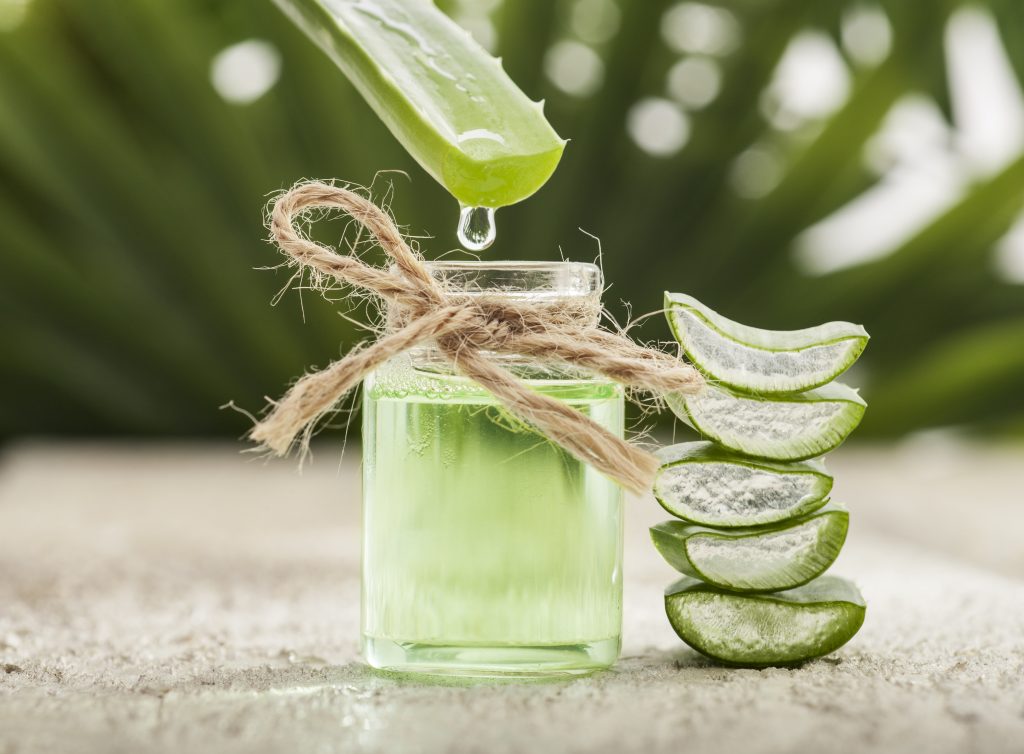
In the field of holistic medicine and Whole Health Care aloe vera is rightly famed for its impressive skin healing properties, as many of us who’ve suffered sun burns can attest! This wonder plant has proven to be one of the most versatile remedies found in Nature’s pharmacy. Derived from the leaves of the succulent perennial Aloe barbadensis miller – one of 420 species that make up the genus Aloe – the vitamin and mineral rich gel is applied for a wide array of medical, pharmaceutical, and cosmetic purposes. Aloe vera has even been tested by the United States government as a potential treatment for radiation burns in the event of nuclear warfare. Let’s take a closer look at aloe’s amazing attributes, and how it can help in achieving greater holistic health.
Aloe comes in two forms: gel, the most used variant, is extracted from the inner part of the leaf while aloe latex, which can be ingested orally, is taken from under the plant’s kin. As mentioned above aloe has a trove of vitamins and minerals, with up to 75 potentially active components being identified, all vital for insuring proper functioning of all the major body systems. Among them are Vitamins A, C, E, and B12, all 8 essential amino acids, minerals such as calcium, magnesium, potassium, and zinc, as well as the anti-inflammatory hormones called auxins and gibberellins which aid in wound healing. It also provides 4 anti-inflammatory essential fatty acids, including cholesterol. All of these components contribute to aloe’s renowned skin treating capabilities; on record as far back as Ancient Egypt (the queens Nefertiti and Cleopatra utilized it for cosmetic purposes). It is highly esteemed in both Ayurvedic and Chinese medicine, two of the oldest systems of practice in the world. In 1820 Aloe was formally listed by American pharmacopeias, before being clinically tested in the 1930s in the treatment of radiotherapy burns. In addition to its time tested role in treating burns, its antiseptic properties have proven beneficial for conditions like psoriasis, dermatitis, herpes, and cold sores, as well for wound treatment.
Aloe’s antibacterial elements also make it a good treatment option for dry scalp and dandruff, helping to eliminate dead skin cells and insure healthy skin growth on the scalp. It has also been shown to treat constipation, due to its high content of anthraquinones, compounds that act as natural laxatives. Coupled with its strong anti-inflammatory agents, Aloe’s laxative properties make it a potential treatment for digestive problems, helping to balance acid/alkaline levels, stimulate digestive bacteria, heal stomach ulcers, and normalize bowel function. A study published in the Journal of Research in Medical Sciences suggests Aloe could potentially be used to aid in alleviating symptoms of irritable bowel syndrome (IBS): 33 patients who were instructed to drink 30 milliliters of aloe juice twice a day reported noticeable improvement in their IBS related pain, as well as a reduction in their flatulence levels.
Enzyme laden aloe can help maintain optimal cell health, transmuting proteins into amino acids and enzymes into energy utilized by cells. Its high zinc content also contributes to maximum immune function helping to combat disease, promote immune enhancing hormone receptors, and destroy harmful bacteria. As mentioned previously aloe’s high vitamin and mineral levels can assist in lowering inflammation, the underlying “silent killer” behind many of today’s medical conditions. Its rich antioxidant properties help to reduce damage by free radicals, maintain cell health, and shield the skin from cancer inducing damage from UV rays. Some interesting evidence seems to indicate that aloe can be a potential remedy for diabetes, as it appears to positively influence chronic hypoglycemia.
While no major side effects have been reported for topical use of Aloe gel, taking large amounts of Aloe latex orally can be potentially hazardous. Symptoms can include diarrhea, abdominal cramping, loss of vision, muscle weakness, and nausea. Doses of 1 gram per day or more can lead to kidney damage and stomach ulcers. Women who are pregnant or nursing are advised not to take aloe orally, as it may generate a miscarriage or premature birth. It can also lead to problems if ingested by children under 12 such as cramping, nausea, and diarrhea. People diagnosed with Crohn’s disease, colitis, and other intestinal disorders should also avoid it, as it is a powerful bowel irritant.
When it comes to selecting aloe, not all products are created equal. Mass commercial practices of grinding, crushing, pressing, and filtration of aloe extracts can remove most of not all of the active properties. To get the greatest bang for your buck be sure to verify the product labels carefully, and look for the International Aloe Science Council certification mark. And, as with all dietary and herbal supplements, consult your healthcare provider before incorporating aloe vera into your self-care and Whole Health regime.
For more whole health discussions, visit Living Above The Drama and tune in to Dr. Georgianna Donadio's hit show on iHeartRadio.
